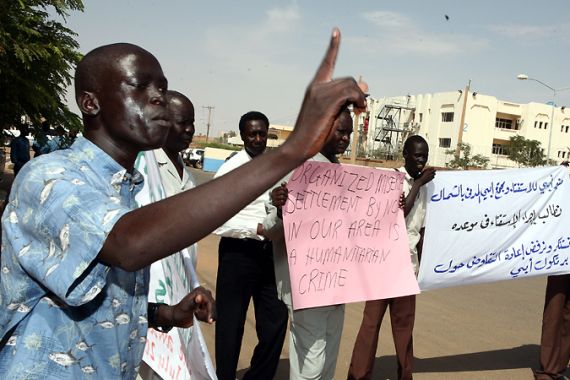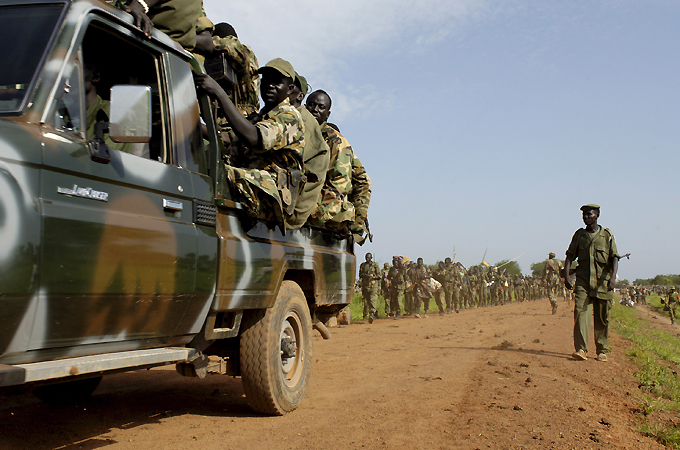Sudanese region may hold own vote
Abyei, the oil-rich region of Sudan, may take plebiscite into own hands if north and south fail to resolve dispute.

 |
| Oil-rich Abyei has become a sticking point that threatens the north-south peace process [EPA] |
The paramount chief of the Dinka Ngok tribesmen, from Sudan’s Abyei region, has said his oil-rich territory could organise its own referendum on its future if authorities fail to reach agreement on the details of a planned ballot.
Abyei is supposed to vote on whether the region will be part of north or south Sudan on January 9 next year, as the south of the country decides if it will secede.
Most commentators believe the southerners will vote for independence and that the Abyei plebiscite will effectively be a vote on whether to join South Sudan as it breaks away.
However, a dispute between authorities in the north and south over who will organise the referendum and who will be allow to take part is casting doubts over whether the Abyei vote will take place.
The southern position is that members of the the Dinka Ngok tribe and other residents should vote in the plebiscite. The north, however, argues that the nomadic Arab Misseriya who travel south to Abyei for a few months every year to graze cattle must also be included.
“We are waiting for our affairs to be solved. If not we want to make our referendum by ourselves legally – we will do it,” Kuol Deng Kuol, the highest chief of the Dinka Ngok, told the Reuters news agency in a telephone interview on Tuesday.
“After the end of this month we expect if nothing happens maybe we will take steps forward,” he said, speaking after his tribe’s congress.
Abyei has become a sticking point that threatens the north-south peace process, which ended two decades of civil war in 2005, under which the southern referendum is being held. High-level talks have so far failed to reach a compromise between the two parties.
‘Ghastly’ consequences
The chief’s comments came as East African leaders met in the Ethiopian capital to discuss the tensions surrounding the Sudanese referendums, along with reinforcing the African Union force in Somalia.
The Inter-Governmental Authority on Development (IGAD) summit was delayed by several hours on Tuesday as Meles Zenawi, the Ethiopian prime minister and the summit’s host, mediated a separate meeting between the two Sudanese sides.
No information was made public about the talks between Omar al-Bashir, Sudan’s president, and Silva Kiir, the south Sudanese leader.
Zenawi warned of “ghastly” consequences for Africa if Sudan returns to war in the wake of the independence referendum in 47 days.
“Like all doomsday scenarios [a return to war] is too ghastly to contemplate,” Meles told Reuters in an interview.
All-out war was “possible but not inevitable,” he said.
“That is why we have to use everything in our capacity to stop it from happening because the alternative is massively destructive not only for Sudan or the Horn of Africa, but the continent as whole,” he said.
Yoweri Museveni, the president of Uganda, and Ismail Omar Guelleh, the president of Djibouti are also attending the summit, which is being held behind closed doors. Sharif Ahmed, Somalia’s president, is not attending.
Hailemariam Desalegn, Ethiopia’s foreign minister, said ahead of the meeting that despite progress on the implementation of the 2005 Comprehensive Peace Agreement in Sudan, there were still unresolved issues.
“The issues which are pending are Abyei, which is under negotiation … the demarcation process and again citizenship,” he said.
Death threats
In another development which risks further undermining the independence referendum, south Sudanese living in Uganda are being warned not to register to vote, the International Organisation for Migration (IOM), a Geneva-based organisation, reported.
Staff of the IOM, which is co-ordinating the registration of Sudanese voters in Uganda, say they have also received menacing calls and letters.
The Khartoum-based commission organising the plebiscite said it was looking into reports the threats were being made by south Sudanese campaigners trying to limit voting outside the south because they feared the polling there might be rigged.
“There have been death threats by telephone, in letters, banging on doors in the middle of the night,” a diplomatic source told Reuters, speaking on condition of anonymity.
UN referendum monitors on Monday said they had received “disturbing reports of intimidation and threats” against IOM staff and potential voters.
“We urge the parties [north and south] to help ensure that everyone who wants to register can do so without fear,” Benjamin Mkapa, a former Tanzanian president who is heading the panel, said.
Anne Itto, a senior official of the Sudan People’s Liberation Movement (SPLM), told journalists on Tuesday that her party had not been involved in any intimidation of voters, without referring specifically to Uganda.